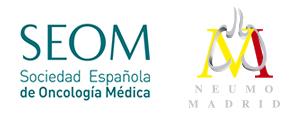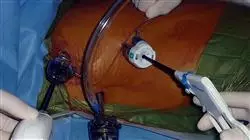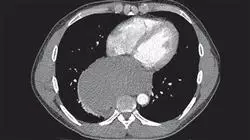Titulación universitaria
Avalista científico

La mayor facultad de medicina del mundo”
Presentación del programa
La biología molecular es hoy día clave en el diagnóstico y tratamiento del cáncer, y ha pasado de ser un campo de investigación, a ser una herramienta imprescindible en el manejo de los pacientes oncológicos”

Hoy en día, hablar de oncología es hablar de “equipos multidisciplinares”, de avances en campos de la ciencia que cada vez están más implicados, y esto aparte de interesante, hace que se necesite una capacitación continua que muchas veces es difícil de adquirir en otros programas de capacitación o congresos puesto que están orientados a un área muy específica y propia de una sola especialidad. De hecho, una capacidad que TECH pretende que alcance el alumno con Este Máster Título Propio es que tenga una visión amplia y clara de la oncología, y utilice la comparación de los avances científicos en cada área como herramienta que le permitirá avanzar en el conocimiento.
El Máster Título Propio en Oncología Torácica va a permitir adquirir unos conocimientos que serán de enorme utilidad en el trabajo diario basado en un trabajo crítico, una exposición sencilla y una metodología eficaz. Para ello TECH pone a su disposición un elenco de profesores que están en la primera división en el manejo del Cáncer,
y muchos líderes a nivel internacional, que han preparado en profundidad cada tema desde su visión y con la sencillez que requiere el tener que explicar el tema a otro especialista. Además, teniendo siempre presente que el fin último del programa es que el conocimiento pueda ser adquirido por cualquier médico interesado en los tumores torácicos.
Por último, y con este afán por entender que el conocimiento cuando fluye y nutre todas las ramas permite conseguir grandes avances, se presenta un programa que ayudará a aumentar el potencial de los egresados gracias a la colaboración con otros profesionales y a la revolucionaria metodología e-learning. El programa cuenta con la participación de un destacado Director Invitado Internacional, que impartirá 10 rigurosas Masterclasses que contribuirán a que los egresados desarrollen competencias clínicas avanzadas.
Un prestigioso Director Invitado Internacional brindará 10 disruptivas Masterclasses sobre los últimos avances en el campo de la Oncología Torácica”
##Este/Esta## Máster Título Propio en Oncología Torácica contiene el programa científico más completo y actualizado del mercado. Sus características más destacadas son:
- Desarrollo de más de 75 casos clínicos presentados por expertos en Oncología Torácica
Sus contenidos gráficos, esquemáticos y eminentemente prácticos con los que están concebidos, recogen una información científica y asistencial sobre aquellas disciplinas indispensables para el ejercicio profesional - Novedades diagnóstico-terapéuticas sobre evaluación, diagnóstico e intervención en Oncología Torácica
- Contiene ejercicios prácticos donde realizar el proceso de autoevaluación para mejorar el aprendizaje
- Iconografía clínica y de pruebas de imágenes con fines diagnósticos
- Sistema interactivo de aprendizaje basado en algoritmos para la toma de decisiones sobre las situaciones clínicas planteadas
- Con especial hincapié en la medicina basada en la evidencia y las metodologías de la investigación en Oncología Torácica
- Todo esto se complementará con lecciones teóricas, preguntas al experto, foros de discusión de temas controvertidos y trabajos de reflexión individual
- Disponibilidad de los contenidos desde cualquier dispositivo fijo o portátil con conexión a internet
Este Máster Título Propio es la mejor inversión que puedes hacer en la selección de un programa de actualización por dos motivos: además de poner al día tus conocimientos en Oncología Torácica, obtendrás un título de Máster Título Propio por Oncología Torácica”
Incluye en su cuadro docente profesionales pertenecientes al ámbito de la Oncología Torácica, que vierten en esta preparación la experiencia de su trabajo, además
de reconocidos especialistas pertenecientes a sociedades científicas de referencia.
Gracias a su contenido multimedia elaborado con la última tecnología educativa, permitirá al profesional un aprendizaje situado y contextual, es decir, un entorno simulado que proporcionará un aprendizaje inmersivo programado para entrenarse ante situaciones reales.
El diseño de este programa se centra en el Aprendizaje Basado en Problemas, mediante el cual el médico deberá tratar de resolver las distintas situaciones de práctica profesional que se le planteen a lo largo del programa. Para ello,
el médico contará con la ayuda de un novedoso sistema de vídeos interactivos realizados por reconocidos expertos en el campo de la Oncología Torácica
y con gran experiencia docente.
El programa permite ejercitarse en entornos simulados, que proporcionan un aprendizaje inmersivo programado para entrenarse ante situaciones reales"

Incluye casos clínicos para acercar al máximo el desarrollo del programa a la realidad de la atención médica"
¿Por qué estudiar en TECH?
TECH es la mayor Universidad digital del mundo. Con un impresionante catálogo de más de 14.000 programas universitarios, disponibles en 11 idiomas, se posiciona como líder en empleabilidad, con una tasa de inserción laboral del 99%. Además, cuenta con un enorme claustro de más de 6.000 profesores de máximo prestigio internacional.

Estudia en la mayor universidad digital del mundo y asegura tu éxito profesional. El futuro empieza en TECH”
La mejor universidad online del mundo según FORBES
La prestigiosa revista Forbes, especializada en negocios y finanzas, ha destacado a TECH como «la mejor universidad online del mundo». Así lo han hecho constar recientemente en un artículo de su edición digital en el que se hacen eco del caso de éxito de esta institución, «gracias a la oferta académica que ofrece, la selección de su personal docente, y un método de aprendizaje innovador orientado a formar a los profesionales del futuro».
Un método de estudio disruptivo, un claustro de vanguardia y su orientación práctica: la clave del éxito de TECH.
Los planes de estudio más completos del panorama universitario
TECH ofrece los planes de estudio más completos del panorama universitario, con temarios que abarcan conceptos fundamentales y, al mismo tiempo, los principales avances científicos en sus áreas científicas específicas. Asimismo, estos programas son actualizados continuamente para garantizar al alumnado la vanguardia académica y las competencias profesionales más demandadas. De esta forma, los títulos de la universidad proporcionan a sus egresados una significativa ventaja para impulsar sus carreras hacia el éxito.
TECH cuenta con los planes de estudio más completos e intensivos del panorama universitario actual.
El mejor claustro docente top internacional
El claustro docente de TECH está integrado por más de 6.000 profesores de máximo prestigio internacional. Catedráticos, investigadores y altos ejecutivos de multinacionales, entre los cuales se destacan Isaiah Covington, entrenador de rendimiento de los Boston Celtics; Magda Romanska, investigadora principal de MetaLAB de Harvard; Ignacio Wistumba, presidente del departamento de patología molecular traslacional del MD Anderson Cancer Center; o D.W Pine, director creativo de la revista TIME, entre otros.
Expertos de talla internacional, especializados en ramas diversas de la Salud, Tecnología, Comunicación y Negocios, forman parte del claustro de TECH.
Un método de aprendizaje único
TECH es la primera universidad que emplea el Relearning en todas sus titulaciones. Se trata de la mejor metodología de aprendizaje online, acreditada con certificaciones internacionales de calidad docente, dispuestas por agencias educativas de prestigio. Además, este disruptivo modelo académico se complementa con el “Método del Caso”, configurando así una estrategia de docencia online única. También en ella se implementan recursos didácticos innovadores entre los que destacan vídeos en detalle, infografías y resúmenes interactivos.
TECH combina el Relearning y el Método del Caso en todos sus programas universitarios para garantizar un aprendizaje teórico-práctico de excelencia estudiando cuando quieras y desde donde quieras.
La mayor universidad digital del mundo
TECH es la mayor universidad digital del mundo. Somos la mayor institución educativa, con el mejor y más amplio catálogo educativo digital, cien por cien online y abarcando la gran mayoría de áreas de conocimiento. Ofrecemos el mayor número de titulaciones propias, titulaciones oficiales de posgrado y de grado universitario del mundo. En total, más de 14.000 títulos universitarios, en once idiomas distintos, que nos convierten en la mayor institución educativa del mundo.
TECH cuenta con el catálogo de programas académicos y oficiales más extenso del mundo y disponible en más de 11 idiomas.
Google Partner Premier
El gigante tecnológico norteamericano ha otorgado TECH la insignia Google Partner Premier. Este galardón, solo al alcance del 3% de las empresas del mundo, pone en valor la experiencia eficaz, flexible y adaptada que esta universidad proporciona al alumno. El reconocimiento no solo acredita el máximo rigor, rendimiento e inversión en las infraestructuras digitales de TECH, sino que también sitúa a esta universidad como una de las compañías tecnológicas más punteras del mundo.
Google ha ubicado a TECH en el top 3% de las empresas tecnológicas más importantes del mundo al concederle su insignia Google Partner Premier.
La universidad online oficial de la NBA
TECH es la universidad online oficial de la NBA. Gracias a un acuerdo con la mayor liga de baloncesto, ofrece a sus alumnos programas universitarios exclusivos, así como una gran variedad de recursos educativos centrados en el negocio de la liga y otras áreas de la industria del deporte. Cada programa tiene un currículo de diseño único y cuenta con oradores invitados de excepción: profesionales con una distinguida trayectoria deportiva que ofrecerán su experiencia en los temas más relevantes.
TECH ha sido reconocida por la NBA, la liga de baloncesto más importante del mundo, como su universidad online oficial.
La universidad mejor valorada por sus alumnos
Los alumnos han posicionado a TECH como la universidad mejor valorada del mundo en los principales portales de opinión, destacando su calificación más alta de 4,9 sobre 5, obtenida a partir de más de 1.000 reseñas. Estos resultados consolidan a TECH como la institución universitaria de referencia a nivel internacional, reflejando la excelencia y el impacto positivo de su modelo educativo.
TECH es la universidad mejor valorada por sus alumnos en el mundo.
Líderes en empleabilidad
TECH ha conseguido convertirse en la universidad líder en empleabilidad. El 99% de sus alumnos obtienen trabajo en el campo académico que ha estudiado, antes de completar un año luego de finalizar cualquiera de los programas de la universidad. Una cifra similar consigue mejorar su carrera profesional de forma inmediata. Todo ello gracias a una metodología de estudio que basa su eficacia en la adquisición de competencias prácticas, totalmente necesarias para el desarrollo profesional.
El 99% de los egresados de TECH consiguen empleo en poco menos de año tras completar sus estudios.
Máster en Oncología Torácica
La lucha contra el cáncer ha sido uno de los constantes desafíos a los que se enfrenta la medicina en su más amplio alcance. De cuantas ramificaciones se adhieren a este núcleo de enfermedades neoplásicas, el cáncer de pulmón es uno de los más recurrentes; cerca de 1,7 millones de personas mueren anualmente por esta causa. Si bien, los estudios al respecto demuestran una tendencia prometedora en cuanto al descenso de mortandad, hay aun continuas mejoras que realizar respecto al diagnóstico y tratamiento de las diversas masas anormales de tejido descubiertas en la zona pectoral. Es por ello que TECH Global University presenta su Máster en Oncología Torácica: una oportunidad del más sofisticado nivel académico para que el estudiante pueda agregar a su cúmulo de saberes una pormenorización teórico-práctica sobre una de las manifestaciones cancerígenas más frecuentes. Nuestro programa está diseñado con la densidad curricular que compete a la medicina clásica pero adaptada a la modernidad de un entorno virtual de fácil acceso, entendimiento e interacción. Proveer eficiencia y excelencia es nuestra consigna.
Especialízate en una parte vital de la oncología
Al acceder a nuestro programa contarás con varias ventajas que te motivarán a seguir un aprendizaje continuo: la flexibilidad horaria que te permite desempeñar simultáneamente otras actividades, bien sea personales o incluso laborales, el contenido multimedia basado en innovadoras técnicas de aprendizaje virtual y la amplitud de conocimientos a través de un completo pénsum académico que engloba desde los fundamentos básicos hasta los conceptos más avanzados. En un recorrido a través de diez módulos podrás instruirte en temáticas como: la oncología traslacional, los diferentes tipos de carcinomas no microcíticos de pulmón, los tumores de la pleura, mediastino y pared torácica, el manejo paliativo del paciente e incluso la gestión clínica basada en el Networking. Porque sabemos que los buenos resultados dependen de la calidad del interventor, en TECH te brindamos la satisfacción de transformar tu carrera en una verdadera herramienta que inspire y cree una mejor vida para ti y para otros.







